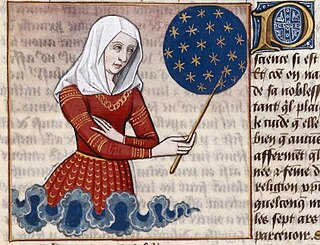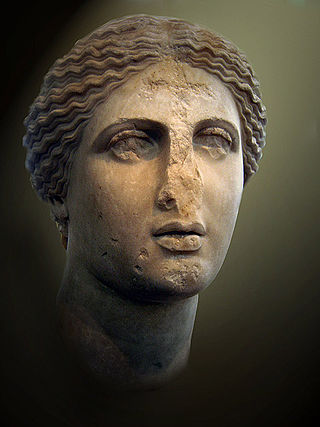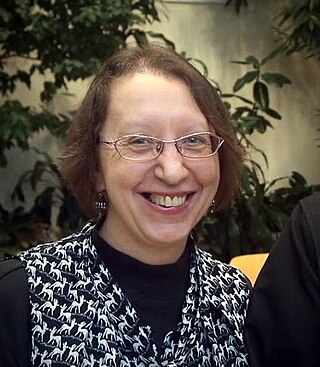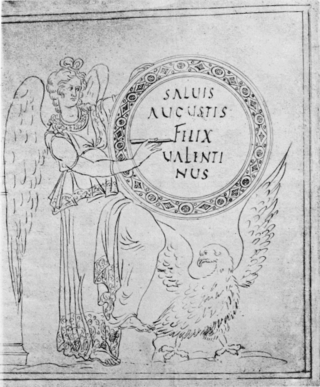Related Research Articles

Ambrose of Milan, venerated as Saint Ambrose, was a theologian and statesman who served as Bishop of Milan from 374 to 397. He expressed himself prominently as a public figure, fiercely promoting Roman Christianity against Arianism and paganism. He left a substantial collection of writings, of which the best known include the ethical commentary De officiis ministrorum (377–391), and the exegetical Exameron (386–390). His preachings, his actions and his literary works, in addition to his innovative musical hymnography, made him one of the most influential ecclesiastical figures of the 4th century.
Priscillian was a wealthy nobleman of Roman Hispania who promoted a strict form of Christian asceticism. He became bishop of Ávila in 380. Certain practices of his followers were denounced at the Council of Zaragoza in 380. Tensions between Priscillian and bishops opposed to his views continued, as well as political maneuvering by both sides. Around 385, Priscillian was charged with sorcery and executed by authority of the Emperor Maximus. The ascetic movement Priscillianism is named after him, and continued in Hispania and Gaul until the late 6th century. Tractates by Priscillian and close followers, which were thought lost, were discovered in 1885 and published in 1889.
Christianization is a term for the specific type of change that occurs when someone or something has been or is being converted to Christianity. Christianization has, for the most part, spread through missions by individual conversions but has also, in some instances, been the result of coercion from governments or military leaders. Christianization is also the term used to designate the conversion of previously non-Christian practices, spaces and places to Christian uses and names. In a third manner, the term has been used to describe the changes that naturally emerge in a nation when sufficient numbers of individuals convert, or when secular leaders require those changes. Christianization of a nation is an ongoing process.
Postumius Rufius Festus Avienius was a Latin writer of the 4th century AD. He was a native of Volsinii in Etruria, from the distinguished family of the Rufii Festi.
Flavius Valila Theodosius or Theodobius was a Roman senator and military commander who held the office of magister militum in the west in 471. Valila, who was of Gothic origin, endowed a Christian church on his property near Tibur. At his death, he bequeathed the 4th century basilica of Junius Annius Bassus on the Esquiline Hill in Rome to the Church, and Pope Simplicius dedicated it to St. Andrew, which later came to be known as Sant'Andrea Catabarbara.

Faltonia Betitia Proba was a Latin Roman Christian poet, perhaps the earliest female Christian poet whose work survives. A member of one of the most influential aristocratic families, she composed the Cento Vergilianus de laudibus Christi, a cento composed with verses by Virgil re-ordered to form an epic poem centred on the life of Jesus.

The growth of Christianity from its obscure origin c. 40 AD, with fewer than 1,000 followers, to being the majority religion of the entire Roman Empire by AD 400, has been examined through a wide variety of historiographical approaches.

Giacomo Boni was an Italian archaeologist specializing in Roman architecture. He is most famous for his work in the Roman Forum.

Paganism is commonly used to refer to various religions that existed during Antiquity and the Middle Ages, such as the Greco-Roman religions of the Roman Empire, including the Roman imperial cult, the various mystery religions, religions such as Neoplatonism and Gnosticism, and more localized ethnic religions practiced both inside and outside the empire. During the Middle Ages, the term was also adapted to refer to religions practiced outside the former Roman Empire, such as Germanic paganism, Egyptian paganism and Baltic paganism.
Clodius Celsinus Adelphius or Adelfius was a politician of the Roman Empire.
Volusius Venustus was an aristocrat of the Roman Empire.
Aurelius Valerius Symmachus Tullianus was a Roman senator and aristocrat. He was appointed consul in 330 by the emperor Constantine.
Lucius Aurelius Avianius SymmachussignoPhosphorius was an aristocrat of the Roman Empire, and father of Quintus Aurelius Symmachus.
Petronius Probianus was a politician of the Roman Empire.
Aurelius Celsinus was a politician of the Roman Empire.

Persecution of pagans in the late Roman Empire began during the reign of Constantine the Great in the military colony of Aelia Capitolina (Jerusalem), when he destroyed a pagan temple for the purpose of constructing a Christian church. Rome had periodically confiscated church properties, and Constantine was vigorous in reclaiming them whenever these issues were brought to his attention. Christian historians alleged that Hadrian had constructed a temple to Venus on the site of the crucifixion of Jesus on Golgotha hill in order to suppress Christian veneration there. Constantine used that to justify the temple's destruction, saying he was simply reclaiming the property. Using the vocabulary of reclamation, Constantine acquired several more sites of Christian significance in the Holy Land.

Marianne Sághy was a Hungarian expert on the religious and social culture of Late Antiquity, with an especial focus on the cult of saints and hagiography. She was associate professor at the Department of Medieval Studies, Central European University, and at the Department of Medieval and Early Modern Universal History, Eötvös Loránd University, Budapest.

Henchir-El-Msaadine is a Roman era set of ruins near Tebourba(Ancient Thuburbo Minus) in modern Tunisia, North Africa. The site is outside of Tunis. The ruins are tentatively identified as the remains of Municipium Aurelium Antoninianum Furnitanorum also known as Furnos Minor, a city of Africa Proconsularis. Furnos Minus had the rank of a Municipium (city) of Africa Proconsularis and has been identified through Epigraphic remains

Michele Renee Salzman is a distinguished professor of history at the University of California, Riverside. She is an expert on the religious and social history of late antiquity.

Acilius Severus was a Roman Christian writer of the late 4th century AD, from Hispania. He was from a senatorial family based on known correspondence with the Roman writer Lactantius through written epistles to his ancestors. A fragmentary inscription dicated that his ancestry was rooted from the gens Acilia, a noble family since the first century CE. Severus’ father, who was also called Acilius Severus, was a Roman consul in 323 and prefect of Rome from 325 to 327.
References
- 1 2 Salzman, Michele Renee; Sághy, Marianne; Testa, Rita Lizzi, eds. (2015-11-12). Pagans and Christians in Late Antique Rome: Conflict, Competition, and Coexistence in the Fourth Century. The Wiles Lectures (1 ed.). Cambridge University Press. pp. xiv. doi:10.1017/cbo9781316274989. ISBN 978-1-107-11030-4.
- 1 2 "Curriculum di Rita Lizzi - Università degli Studi di Perugia". www.unipg.it (in Italian). Retrieved 2024-01-05.
- 1 2 "Lizzi, Rita | Accademia Nazionale dei Lincei". www.lincei.it (in Italian). Retrieved 2024-01-05.
- ↑ "Class of Ambrosian Studies". Veneranda Biblioteca Ambrosiana. Retrieved 2024-01-05.
- ↑ "CUA Studies in Early Christianity". The Catholic University of America. Retrieved 2024-01-05.
- ↑ "Christianity in Late Antiquity titles from University of California Press". www.ucpress.edu. Retrieved 2024-01-05.
- ↑ "Prof.ssa Rita Lizzi Università di Perugia entra nell'Accademia dei Lincei". umbriajournal.com (in Italian). 2023-07-31. Retrieved 2024-01-05.
- ↑ Horsley, G. H. R. (1993). "Review of Vescovi e strutture ecclesiastiche nella città tardoantica. (L'Italia Annonaria nel IV-V secolo d. C.)". Gnomon. 65 (5): 421–426. ISSN 0017-1417. JSTOR 27691388.
- ↑ Chauvot, Alain (2008). "Review of Senatori, popolo, papi. Il governo di Roma al tempo dei Valentiniani. (Munera, 21)". L'Antiquité Classique. 77: 702–705. ISSN 0770-2817. JSTOR 41813225.
- ↑ Montero, Santiago (2006). "Senatori, popolo, papi. Il governo di Roma al tempo dei Valentiniani". Gerión. 24 (2): 111–112. Retrieved 2024-01-06.
- ↑ Fiorentini, Marzia (April 3, 2023). "Review of: Christian emperors and Roman elites in Late Antiquity". Bryn Mawr Classical Review. ISSN 1055-7660.
- ↑ Drake, H. A. (June 2023). "Christian Emperors and Roman Elites in Late Antiquity. By Rita Lizzi Testa. London: Routledge, 2022. xxxi + 279 pp. $143.00 cloth". Church History. 92 (2): 409–411. doi:10.1017/S000964072300197X. ISSN 0009-6407. S2CID 263633335.
- ↑ Greenwood, David Neal (2018-09-01). "Review: Pagans and Christians in Late Antique Rome: Conflict, Competition, and Coexistence in the Fourth Century, edited by Michele Renée Salzman, Mariane Sághy, and Rita Lizzi Testa". Studies in Late Antiquity. 2 (3): 426–429. doi:10.1525/sla.2018.2.3.426. ISSN 2470-6469.
- ↑ Becker, Matthias (2017-08-06). "Michele Renee Salzman / Marianne Sághi / Rita Lizzi Testa (Eds.), Pagans and Christians in Late Antique Rome. Conflict, Competition, and Coexistence in the Fourth Century. New York, Cambridge University Press 2016". Historische Zeitschrift (in German). 305 (1): 173–174. doi:10.1515/hzhz-2017-1292. ISSN 2196-680X. S2CID 165073624.
- ↑ Hones, Stephan (2013-01-01). "Peter Brown & Rita Lizzi Testa (eds.), Pagans and Christians in the Roman Empire: The Breaking of a Dialogue (IVth–VIth Century A.D.). Proceedings of the International Conference at the Monastery of Bose (October 2008) (Wien: Lit, 2011), 639 pp., ISBN: 978-3-643-90069-2, €79.90 (paperback)". Journal of Religion in Europe. 6 (2): 263–265. doi:10.1163/18748929-00602008. ISSN 1874-8929.
- ↑ Humphries, Mark (2018). "Late Antiquity in Contemporary Debate ed. by Rita Lizzi Testa (review)". Journal of Late Antiquity. 11 (2): 432–434. doi:10.1353/jla.2018.0024. ISSN 1942-1273. S2CID 165397517.
- ↑ Gilhus, Ingvild Sælid (2018-03-01). "Review: Late Antiquity in Contemporary Debate, edited by Rita Lizzi Testa". Studies in Late Antiquity. 2 (1): 126–128. doi:10.1525/sla.2018.2.1.126. ISSN 2470-6469.
- ↑ Trout, Dennis E. (July 26, 2017). "Rita Lizzi Testa (ed.), Late Antiquity in Contemporary Debate. Newcastle upon Tyne: Cambridge Scholars Publishing, 2017. Pp. 280. ISBN 9781443843089. $90.95". Bryn Mawr Classical Review. Retrieved 2024-01-06.